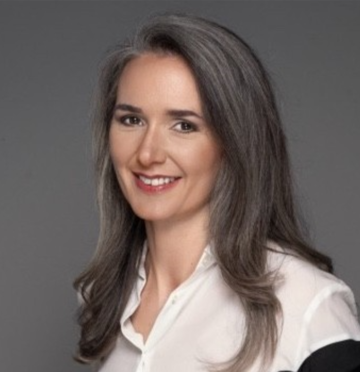Esther Reynal de St Michel Richardot, founder of Thena Capital

Esther Reynal is a venture capitalist and experienced investor. Five years ago she first envisaged Thena Capital, a venture capital fund investing in early stage MedTech and has since developed this vision with two other women. She is passionate about the positive impact of her investments: the future of MedTech in healthcare and delivering strong returns for her investors. Her experience as a growth strategy consultant has played a critical role in her evaluation of potential investment opportunities and the importance of having a strong culture from the inception of a business.
What is your background? What made you decide to get involved in supporting entrepreneurs?
After my MBA I went more into growth strategy consulting. The other co-founder of Thena and I started developing the idea of a venture capital fund around 5 or 6 years ago and then it became more specific 3 years ago. Our experience and expertise made sense as we had the relevant ability to identify trends, opportunities and market dynamics. When collaborating with early-stage founders my skillset was highly valuable. That’s when we decided to go for it and start our venture capital fund. It wasn’t about being an entrepreneur. It was about asking ‘How can we drive impact by investing in early-stage MedTech companies?” We became entrepreneurs in the process of doing that.

For me it’s about having a vision and being capable of operationalizing it. It’s not just having a great idea. Being able to really deliver against that vision whilst engaging with and inspiring the people working alongside you is a key requirement.
How and when did you know your idea was good enough to develop it?
It started with the development of the idea with my co-founder and finding the third member of the team until there were three of us who understood we were onto something. From there it was a matter of testing the idea with people in different systems, different types of investors and founders to really understand their needs. When you have a lot of people saying “you’re really onto something keep working, keep going” you build further confidence in your idea. Although that doesn’t mean you don’t question it throughout the journey!
What would you say are the top 3 skills that needed to be a successful entrepreneur? Why?
I think there are three qualities required of any entrepreneur and I look for them in the founders I choose to invest in. Being resilient is always number one. So much is going to go wrong but you need to keep going. The second quality is stamina or grit, because it can feel like a constant fight. Finally I would say being adaptable: having a good sense of opportunity and not being afraid to pivot and to stay relevant. Those are three generic requirements but I would say our team is cognitively diverse which makes it even more powerful. One is a community builder who connects people; that’s invaluable as you try to make connections and fundraise. The other has a PhD from Oxford in Medical Sciences, experience in pharmaceutical companies and really strong leadership skills as well. As a team we complement each other.
What is your favourite part of being an entrepreneur?
I think my favourite part is working with early stage companies and seeing how much you can bring to them beyond just capital. We are in MedTech and life sciences so its all about looking towards the future and constantly meeting people with wonderful ideas that have the potential to transform our experience of health and the healthcare system. Seeing the power of innovation and make it visible is wonderful. It feels like you’re part of the future.
What individual, company or organization inspires you most? Why?
For my first choice I think I’d have to say Serena Williams. She is so strong, facing harshness and discrimination like nothing is fazing her. She has that amazing ability to work really, really, really hard. I also admire what she’s done recently, reinventing herself as an investor, starting a venture capital fund and backing underrepresented founders. I find that ability to be successful in such a smart way really inspiring.
I’ve gone far away from my sector for a second choice but I would have to say the French artists, Pierre Soulage and Louise Bourgeois. They both worked long into old age, to around 100 years old. When you look at their work it remained so inventive. They kept on evolving and being fully engaged at a point in their lives when most people are retracting from the world.
Sequoia Capital is an organization that inspires me in my sector. They were one of the first venture capital funds to get big exposure. They have been a leader in the industry, highlighting creative spirit. They are defined, independent thinkers and are receptive to qualities in founders that can be unusual but often indicate success.
If you had 5 minutes with the above individual/ company/organization, what would you want to ask or discuss?
I admire how they all remain relevant despite being established in a sector and I’d love to understand where each got that quality from. Knowing how the two artists stayed creative and relevant whilst creating such powerful work until the end is something I would love to crack. Its hard not to just sit back and enjoy success.
What has been your most satisfying or successful moment in business?
Hopefully in a few months I’ll say it was closing our first fund! That will be a massive highlight in my professional life. Otherwise I don’t have one key event. I get energy and joy when I impact teams and people as a consultant. Suddenly seeing a team click and become creative based on my influence is a moment of high satisfaction. Its all fairly understated in a way and less so about public moments.
What would you say have been some of your mistakes, failures or lessons learned as an entrepreneur?
For me it was an issue of taking too long to start taking risks. Throughout my studies and my early career I thought there were areas that were not for me. No one ever told me so it was just my perception. I never thought investment was for me because the people around me were calling it the ‘investment process.’ Now I see it as an outcome, a tool. In hindsight I wish I had been more curious and pushed the boundaries earlier.
How have you funded your ideas?
That’s the stage we’re currently in. It’s a matter of relying on savings to survive while we fundraise. One of our cornerstone investors will probably be an institutional investor. We’re in discussion with fund of funds, family offices and high net worth individuals. They need to be open to emerging managers and have that appetite for a higher level of risk.
Are there any sector-specific awards/grants/competitions that have helped you?
Not at the moment but we’re working on it. One of the aims for next year is to apply to a few more awards related to investment and innovation. Obviously it’s a really good way of gaining exposure.
What is good about being an entrepreneur in Oxfordshire? Bad?
We’re based in London but we visit Oxford regularly. We held one of our board meetings there recently because we like being in Oxford. I meet with founders there every so often but being in Oxford feels like going back to my student years!
If a new entrepreneur or startup came to you looking for entrepreneurship resources, where would you send them?
That would have to depend on the sector they were in or the type of advice they were looking for. I think the oNetwork at the Saïd Business School is a great resource for entrepreneurs but the most relevant incubators and creative hubs are sector specific. Voyagers is a really good network, an ecosystem of founders and people in healthcare. They get people together to exchange ideas and collaborate. These are the kind of places where like minded people can support each other and get inspired.
Have you faced any challenges as a woman entrepreneur? If so, how have you overcome them?
I’m at a stage in my life where I can handle being in a male dominated industry, but as a female run company, storytelling has proved to be a big challenge. Only 13% of those working in venture capital are female investors and a lot of female investors become more visible because they only invest in female-founded companies. One of the challenges we have faced is the assumption that we only invest in female companies. That’s not accurate. We invest in entrepreneurs and have a gender-smart investment strategy. To minimise biases we have to be very careful about how we tell our story and often omit any mention of our gender strategy or female MedTech unless that is something an investor is specifically interested in. We’re really careful in how we tell our story now.
How could institutions such as the University of Oxford better support women entrepreneurs?
I think the best way to support female entrepreneurs is to make sure that any event around entrepreneurship, investing, anything in the industry, needs to be supper careful about having a gender split. I don’t think female entrepreneurs have challenges specific to being women, but they experience the challenges (possibly heightened) faced by any entrepreneur. Perhaps it is harder to fundraise because of the biases of investors, but the more you fall back and use your gender as an excuse the harder it gets. Institutions like the University of Oxford have a responsibility to show that both entrepreneurs and investors can and should be diverse. It’s a matter of leading by example and foregrounding diversity in entrepreneurship, much like we’re doing here in this interview. Another example is more and more funds offering ‘female founder office hours.’ To me this shouts that normal office hours are for men.
Do you have any advice specifically for other women who want to be entrepreneurs?
Go for it. If there’s a problem and you have a good solution for its just a matter of going for it. There are so many resources, especially the benefits of a tax system that supports investment at early stage.
Any last words of advice?
One thing I’d like to mention is that when you start building a team at the inception of an idea it is key to also start building a culture. If you embed your values, even in a really small team, it will be a key part of the success of your organisation.
Share this
More news



